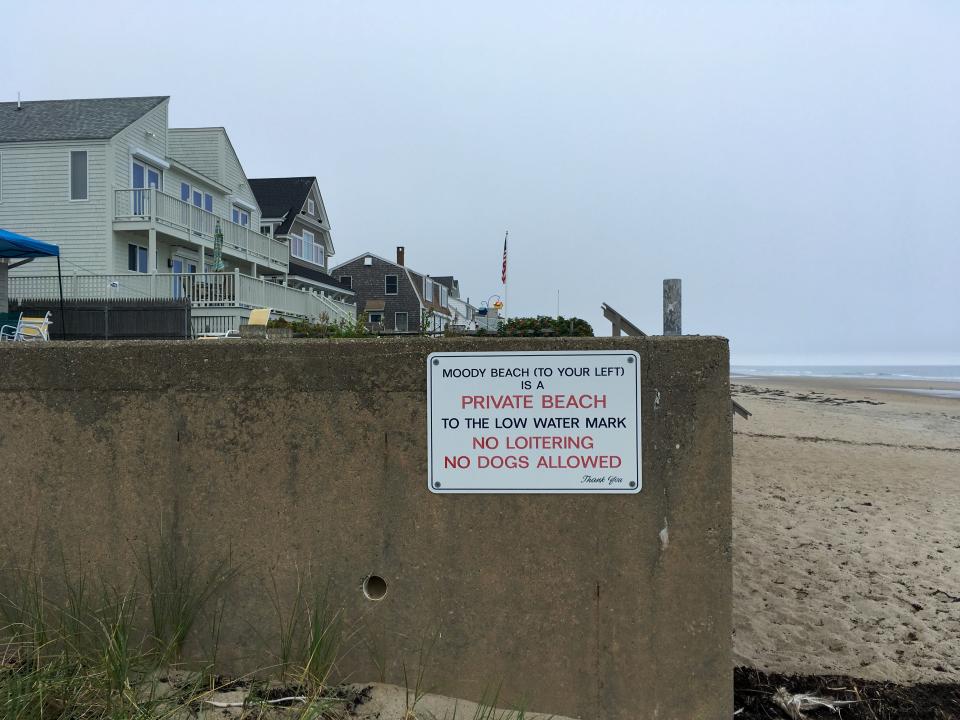Judge allows portion of Maine beach intertidal zone access suit to move forward
WELLS, Maine — A judge has whittled down a wide-ranging lawsuit against intertidal beach property owners to a single question.
What exactly is the scope of the public’s right to access such land?
With no precise answers offered, local plaintiffs may be able to fight another day on at least that front. Otherwise, Superior Court Justice John O’Neil ruled in a decision earlier this week that intertidal zones – those stretches of beaches between the high- and low-water marks – belong to the property owners who live upland.

For Attorney Benjamin Ford, who represents the plaintiffs in the case, the judge’s decision provided just enough reason to keep moving forward.
“Today’s decision proves what every Mainer who relies on our shoreline knows to be true: Maine’s intertidal problem is far from settled,” Ford said in a prepared statement. “We thank the Court for its diligence in addressing these issues and are eager to proceed with the next steps toward reclaiming the Coast of Maine for all Mainers.”
Previous story: Beachgoers suing for public access to Maine coast want day in court
Last April, Ford stood near a private stretch of Moody Beach in Wells and declared he had filed a lawsuit in Portland that sought to return private beaches along the Maine coast to the public. The plaintiffs included both commercial and recreational beachgoers, and the suit took aim at eight defendants, three of whom own intertidal properties in Wells: Judy’s Moody, LLC, OA2012 Trust, and Ocean 503, LLC.

Residents Peter and Cathy Masucci, of Wells, are among Ford’s clients. Others live in such communities as Waldoboro, Bath, Portland, Peaks Island, and Needham, Massachusetts.
Last summer, attorneys for the owners of private beaches – in Harpswell and Friendship, Maine, in addition to Wells, for example – filed motions to dismiss the case altogether.
In his decision, O’Neil granted the motion to dismiss the case as it pertained to the intertidal land owners in Harpswell and Friendship who were caught in a dispute with individuals who were harvesting rockweed on their property for commercial purposes.

However, when it came to the local defendants, Judy’s Moody, OA2012 Trust and Ocean 503, the judge only granted their motions to dismiss in part – asserting that they did indeed own their intertidal land, but leaving vague the question of what constitutes acceptable public use.
In filing the suit last year, Ford took aim at a decision that the Maine Supreme Judicial Court made decades ago. Ford called the decision “an historical mistake” that “locked away thousands of miles of the Maine coast.”
In 1984, homeowners along Moody Beach in Wells accused local and state authorities of failing to treat beachgoers on their private beaches as trespassers. The homeowners asked the court to prohibit the public from using the beach in front of their properties, not only on the dry sand but also the intertidal zone, according to a report on public shoreline access produced by the Maine Sea Grant College Program, the Maine Coastal Program, and the Wells National Estuarine Research Reserve.
Splash into Spring: Ogunquit kicks off season with fair, Patriotic Pooch Pageant and more
Two years later, the Maine Supreme Judicial Court ruled that the colonial ordinance enacted in the 1640s is part of Maine's common law. That ordinance had acknowledged private ownership of beachfront property as including the intertidal zone, extending all the way to the low-tide mark. It had also recognized the public's right to fish, fowl and navigate on privately owned tidelands, according to the report.
In 1989, in Bell v. Town of Wells, known as the Moody Beach case, the state's top court ruled that the only public rights recognized in intertidal areas are those that were outlined in the colonial ordinance: fishing, fowling and navigating.
That means beachfront property owners along Maine's coasts have property rights all the way down to the low-tide area, except for an easement to allow the public to engage in those three permitted activities.
More: Ogunquit's iconic Perkins Cove footbridge to get $2.85M facelift
In his decision, O’Neil noted that the scope of the public’s usage rights “has been pliable.”
“The Law Court has maintained a flexible approach to determining what public uses are allowed in the intertidal area,” O’Neil wrote.
O’Neil added that the court had endorsed public uses of the land that are related to, “but not coextensive with” fishing, fowling and navigation.
“Thus, what constitutes a permissible use of the intertidal zone by the public has taken many forms,” he added.
O’Neil noted that it was not clear which activities the plaintiffs wish to pursue in the intertidal areas. However, he did say it was “conceivable” that they are looking to be able to walk, run or enjoy some other forms of movement on such land. O’Neil even referred to a plaintiff who is a researcher who wishes to access intertidal lands for his professional purposes.
O'Neil noted that the Law Court has not specifically addressed whether activities related to movement or research is permissible within the intertidal zone.
“Given the expansive and broad approach that the Law Court has taken with regard to defining these usage rights, it is conceivable that movement related or research based activity may be an acceptable use," he wrote.
The Associated Press contributed to this report.
This article originally appeared on Portsmouth Herald: Fight over Maine beach access now comes down to one question

